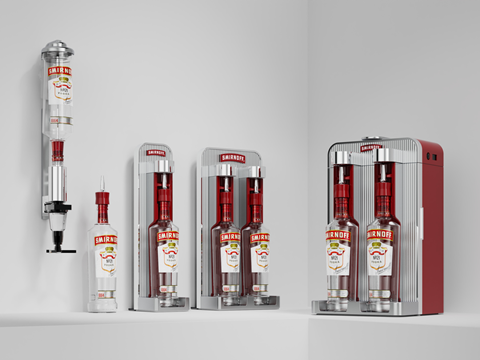
Diageo will trial an in-house, reusable keg and integrated bottle dispensing system with Smirnoff vodka at selected bars in Ireland, citing a potential reduction in carbon emissions of over 50% per litre.
The reusable kegs pipe spirits into a dispensing unit, with four dispensing options available to fit various bar environments. Bespoke technology automatically refills the Smirnoff bottle in the unit.
Once the keg is empty, Diageo will collect, clean, and refill the unit to be redistributed among participating bars.
At the end of its life, Diageo plans to retrieve the unit and separate it for recycling. Recyclability assessments are anticipated to take place after the trial, to be confirmed before the technology is rolled up at scale.
Seven outlets in and around Dublin will trial Everpour for six weeks, weighing up its technical feasibility and gathering consumer feedback. Learnings from the trial will be assessed and implemented into future trials, with Everpour set to contribute to Diageo’s wider carbon reduction efforts across its key brands.
Stainless steel kegs in 5L or 17.5L sizes will be utilized in this phase of the trial. Each keg is hoped to minimize the use of single-use glass bottles to 500 70cl bottles and reduce carbon emissions by over 50% per litre of Smirnoff.
Diageo cites an initial screening Life Cycle Analysis (LCA) – conducted by an independent external expert – that compared Everpour to the carbon emissions of existing 70cl Smirnoff bottles in Ireland. Since emissions may differ between markets, the company plans to conduct additional LCAs once the system is ready to scale up.
Furthermore, this solution is believed to limit the storage space required for vodka bottles and cut down on the time spent switching out and throwing away empty bottles.
Diageo’s Breakthrough Innovation team led Everpour’s development in partnership with Hodges & Drake.
“We’re really excited that Smirnoff is the leading brand on Everpour as we know how important it is to combine convenience for our bartenders and sustainability for our company,” said Stephanie Jacoby, global vodka senior vice president at Diageo. “We continually push the boundaries of what’s traditional in the drinks trade and look forward to learning more about circularity through this exciting trial.”
“This a huge milestone for Diageo to be trialing our first bespoke Diageo-led developed circular economy system for spirits in the on-trade,” added Dave Lutkenhaus, global sustainability innovation director at Diageo. “We’ve designed the system building on the years of insights we have from the on-trade with the aim for Everpour to be convenient and desirable for bartenders to use, whilst reducing our carbon emissions. We’re looking forward to seeing the results from the trial to take into our next round of product development.”
In other news, Diageo has entered a global agreement with ecoSPIRITS to distribute Smirnoff vodka, Gordon’s gin, and Captain Morgan rum in refillable containers via its ‘lower carbon, lower waste’ ecoTOTE technology. This solution is designed to be used up to 150 times and save up to 1,000 glass bottles across its lifespan.
ecoSPIRITS has already circulated 4.5-litre containers of Absolut Vodka, Beefeater gin, and Havana Club rum to various locations in Hong Kong and Singapore. Pernod Ricard’s venture capital fund, Convivialité Ventures, took a minority share in ecoSPIRITS last year; the was money expected to contribute to its leadership position and R&D – including its hardware, software, and IoT research and development programme.
Also, Diageo and PA Consulting are currently trialling a paper-based bottle for Johnnie Walker Black Label scotch whisky. According to an external life cycle analysis, the prototype could reduce carbon emissions by 47% compared to its standard glass equivalent; it is also thought to be 60% lighter.
If you liked this story, you might also enjoy:
The ultimate guide to the Packaging and Packaging Waste Regulation in 2024
How are the top brands progressing on packaging sustainability?
Sustainable Innovation Report 2024: Current trends and future priorities
Everything you need to know about global plastic sustainability regulation














No comments yet